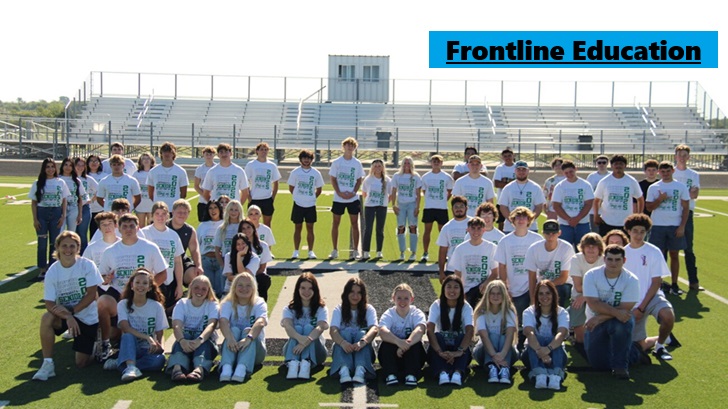Frontline education is an essential aspect of the educational system, focusing on direct engagement with students, parents, and the school community. This area of education involves roles such as teachers, school administrators, counselors, and other professionals who work at the front line to support and educate students. These individuals are crucial in shaping students’ lives, providing quality education, and ensuring schools function smoothly.
In this article, we’ll dive into what frontline education is, explore career paths, look at the best colleges to pursue this field, discuss potential salaries, examine the demand for education roles, and cover other relevant details.
Table of Contents
- What is Frontline Education?
- Types of Careers in Frontline Education
- Best Colleges for Frontline Education in the World
- Average Salary for Frontline Education Professionals
- Demand for Frontline Education Roles Worldwide
- Skills Needed for Frontline Education Careers
- Challenges in Frontline Education
- Future of Frontline Education
- Frequently Asked Questions (FAQs) about Frontline Education
What is Frontline Education?
Frontline education refers to the jobs and roles that directly engage with students and other members of the school community. These professionals serve as the “face” of education, as they work in classrooms, administrative offices, counseling centers, and more to support students’ growth and learning.
Some key roles in frontline education include:
- Teachers: Educators who provide instruction in various subjects and grade levels.
- School Counselors: Professionals who offer guidance to students on academic, personal, and social issues.
- School Administrators: Leaders who manage school operations, including principals, assistant principals, and administrative staff.
- Special Education Teachers: Educators who work with students who have special needs.
- School Nurses: Healthcare professionals who provide medical support and health education within schools.
Types of Careers in Frontline Education
Frontline education careers span a range of roles that focus on direct interaction with students and families. Below are some popular career paths in education:
1. Teachers
- Role: Teachers provide lessons in subjects like math, science, English, social studies, and more. They help students understand core concepts, develop critical thinking skills, and build their knowledge.
- Requirements: Typically requires a bachelor’s degree in education or a specific subject area. Many regions also require state certification or licensing.
2. School Counselors
- Role: School counselors support students by addressing academic and emotional challenges, helping them set goals, and offering career guidance.
- Requirements: Usually requires a master’s degree in counseling or psychology, along with relevant certifications.
3. School Administrators
- Role: Administrators, including principals and vice-principals, are responsible for the smooth operation of schools. They manage staff, handle budgets, enforce policies, and create a safe environment for students.
- Requirements: Often requires a master’s degree in educational leadership or administration.
4. Special Education Teachers
- Role: Special education teachers work with students who have learning, physical, or emotional disabilities. They create individualized education plans (IEPs) tailored to each student’s needs.
- Requirements: A bachelor’s degree in special education is usually required, along with specialized training and certification.
5. School Nurses
- Role: School nurses provide medical care, manage health records, educate students on wellness, and respond to health-related incidents on campus.
- Requirements: Requires a degree in nursing (usually an associate’s or bachelor’s) and a nursing license.
Best Colleges for Frontline Education in the World
Pursuing a education career often begins with choosing the right college or university. Here are some of the best institutions worldwide known for their education programs:
1. Harvard University (USA)
- Location: Cambridge, Massachusetts
- Program: Harvard Graduate School of Education
- Specialties: Educational leadership, counseling, and educational research.
2. University of Oxford (UK)
- Location: Oxford, England
- Program: Department of Education
- Specialties: Teacher training, education policy, and global education research.
3. Stanford University (USA)
- Location: Stanford, California
- Program: Stanford Graduate School of Education
- Specialties: Educational psychology, teaching, and technology in education.
4. University of Cambridge (UK)
- Location: Cambridge, England
- Program: Faculty of Education
- Specialties: Early childhood education, educational policy, and curriculum development.
5. University of Melbourne (Australia)
- Location: Melbourne, Victoria
- Program: Melbourne Graduate School of Education
- Specialties: Teacher education, counseling, and special education.
6. University of Hong Kong (HKU)
- Location: Hong Kong
- Program: Faculty of Education
- Specialties: Educational leadership, language education, and social context in education.
Choosing a college with a strong education program can help you build a solid foundation in education and provide opportunities to specialize in areas like special education, educational leadership, or counseling.
Average Salary for Frontline Education Professionals
Salaries for education professionals vary widely depending on the role, region, level of experience, and the specific school district or institution. Here are some average annual salaries for common frontline education careers:
- Teachers:
- Average Salary: $45,000 – $70,000 (depending on experience and location)
- School Counselors:
- Average Salary: $50,000 – $75,000
- School Administrators (Principals/Assistant Principals):
- Average Salary: $70,000 – $120,000
- Special Education Teachers:
- Average Salary: $50,000 – $80,000
- School Nurses:
- Average Salary: $45,000 – $70,000
Frontline education salaries tend to be higher in urban areas and private schools, though they often reflect the local cost of living and budget allocations.
Demand for Frontline Education Roles Worldwide
The demand for education professionals is growing worldwide, as education remains a top priority for countries aiming to improve literacy and educational quality. Key factors driving this demand include:
- Population Growth: As populations grow, so does the need for more schools, teachers, and educational support staff.
- Increased Focus on Quality Education: There is a global emphasis on improving educational standards, leading to a greater demand for qualified professionals in education.
- Growing Awareness of Mental Health: Schools increasingly focus on student well-being, which has led to a rise in demand for school counselors and mental health professionals.
- Need for Special Education: As awareness and understanding of special needs grow, there’s a greater need for special education teachers who can work with diverse students.
Countries like the United States, Canada, the United Kingdom, Australia, and several European and Asian countries are experiencing high demand for frontline education professionals.
Skills Needed for Frontline Education Careers
Frontline education requires a blend of hard and soft skills to effectively connect with students, colleagues, and parents. Key skills include:
- Communication Skills: Clear and empathetic communication is essential, as these professionals interact with diverse groups daily.
- Patience: Working with students of varying needs and abilities requires patience and understanding.
- Organization and Time Management: Managing classes, meetings, lesson plans, and student records requires excellent organizational skills.
- Problem-Solving: F. education professionals must be able to address students’ and parents’ concerns, often finding solutions in real-time.
- Adaptability: Being able to adapt to different situations and student needs is crucial for success.
Challenges in Frontline Education
While F. education careers are rewarding, they come with unique challenges:
- Workload and Burnout: Teachers and school administrators often face heavy workloads, long hours, and emotional exhaustion, leading to burnout.
- Low Salaries in Some Regions: In some areas, education professionals are underpaid compared to other sectors.
- Behavioral and Mental Health Issues: Educators often face difficulties dealing with behavioral issues and mental health challenges among students.
- Lack of Resources: Many schools, especially in low-income areas, lack sufficient resources, making it hard for educators to provide the quality of education they strive for.
Addressing these challenges requires support from governments, communities, and school administrations.
Future of Frontline Education
The future of frontline education is likely to include more technology, personalized learning, and a greater focus on mental health and special education services. Key trends that could shape F. education include:
- Technology in Classrooms: With the rise of digital tools, teachers and school administrators can use technology to improve learning experiences and streamline administrative tasks.
- Focus on Mental Health: Schools are likely to continue investing in counselors and programs that address student mental health.
- Inclusive Education: More schools will implement inclusive practices that support students with disabilities and special needs.
- Hybrid Learning Models: The pandemic has introduced flexible learning models that may continue to grow, combining online and in-person instruction.
Frequently Asked Questions (FAQs) about Frontline Education
1. What qualifications are needed to work in frontline education?
- Most frontline education roles require a degree in education, counseling, or a related field, along with specific certifications or licenses.
2. How long does it take to become a teacher?
- It typically takes 4-5 years to become a teacher, including obtaining a bachelor’s degree and completing any required certification.
3. Is there a high demand for teachers?
- Yes, many regions have a high demand for teachers, especially in subjects like STEM (Science, Technology, Engineering, Math), special education, and early childhood education.
Frontline education remains one of the most impactful and rewarding career fields, offering professionals the opportunity to shape the lives of students and strengthen communities. Whether as a teacher, counselor, administrator, or nurse, the demand for skilled and passionate education professionals is high and will likely continue to grow.















Leave a Reply